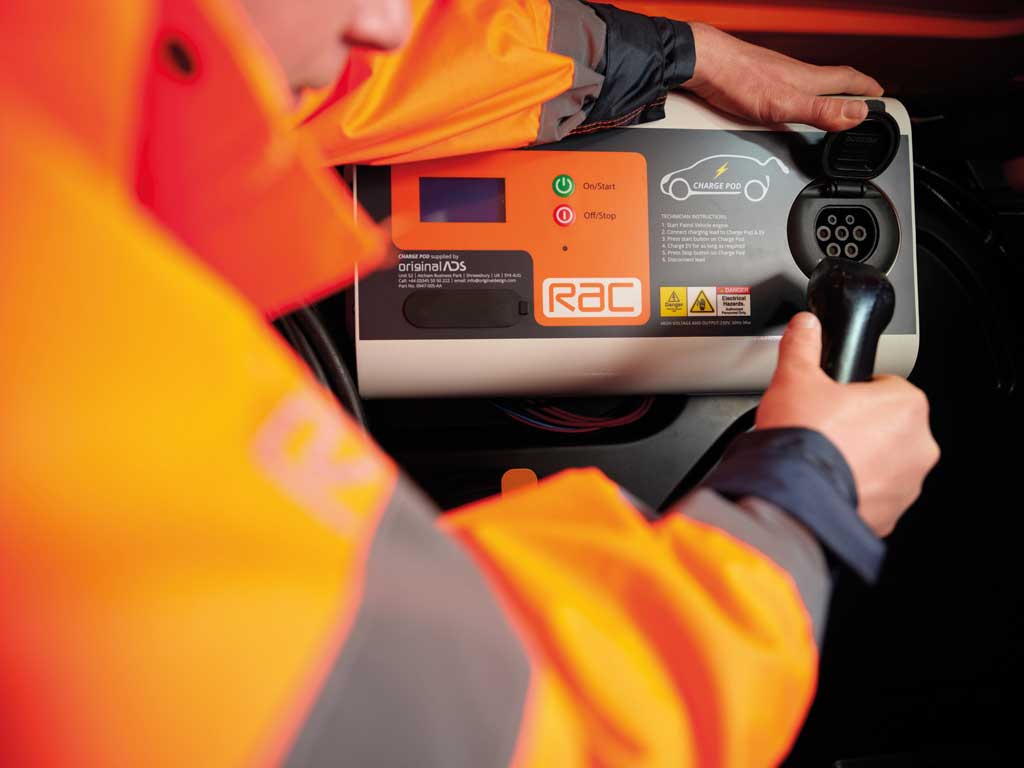
While statistically, it’s less common to run out of charge in an EV than it is to let a fuel tank run dry in a combustion engined car, the incident rate is only likely to increase as electric cars become more and more common. Thankfully the driving range of EVs is improving all the time, and electricity is a lot more common than fuel – can you imagine an infrastructure where every household in the UK had petrol or diesel piped into the walls of our homes? Along with there now being more than 42,000 public charging points, there are also some rather novel ways to get help should the worst-case scenario arise.
Public charging
EVs are pretty good at warning you that the battery is very low before conking out, often with multiple levels of alert that become increasingly nagging, before the car goes into a reduced performance mode to try and get you to a charger at all costs. Models, including the Renault Zoe, Nissan Leaf and Honda e, will limit the car’s speed to 30mph for several miles when the battery is critically low, while some other models will reduce the permitted speed gradually over a distance.
The car’s navigation system or an app or website such as Zapmap can help you find the nearest public charger, and filter results by those which are free to use or require a payment card or smartphone to get a charge.
If your plan is to get to a charger, slow down. While diesel cars tend to be at their most efficient while cruising at around 60mph, EVs typically use less energy the slower they’re driven, so try and get off the motorway onto local roads, all while avoiding heavy acceleration or braking.
Ask for help
As we alluded to in the introduction, electricity is available at virtually every dwelling and business in the UK. If you’re somewhere away from the charging network, try asking a local if they’ll let you have an emergency charge. Some EV owners even advertise the location of their home wallbox chargers, or if you aren’t in a rush, you could post on an EV forum asking if anyone in the area could help out – they might even offer you a cup of tea while you grab a few miles of charge. If you’re going on a long trip, it can be worth taking the car’s three-pin charger for eventualities such as this, even if you never normally use it.
Call roadside assistance
If there’s no way of getting a charge, or your car is already about to grind to a halt, pull off the road or motorway into a safe layby, car park or quiet side road and turn off the car. If your model is fairly new, it most likely still has roadside assistance from its manufacturer, or you may be a member of a breakdown service such as the AA or RAC. Breakdown companies are now pretty clued up when it comes to rescuing stricken EV drivers, and many of their vans have been converted to include generators that can provide an emergency charge. The RAC has started rolling out 5kW chargers in its EV Boost vans, for instance.
While most EVs should never be towed by dragging them – this can cause damage to the traction motors and other energy recuperation technology fitted to electric models – recovery companies have come up with small trailers and skates which can be used to tow an EV with its wheels off the ground, without requiring a flatbed truck.
Charge from another EV
An increasing number of the latest EVs with high-capacity battery packs are also fitted with Vehicle-to-Load (V2L), meaning that as well as receiving a charge, they can also power electrical equipment off the grid and even give other electric cars a charge to get them home or to the next charging station.
Popular models with V2L include the Hyundai Ioniq 5, Kia EV6 and Niro EV and Genesis GV60, which can output up to 3.6kW, while the MG ZS EV and BYD Atto 3 can supply up to 2.2kW to power a campsite or stricken EV.
© Motorworld Media 2023
Registered Office: 4 Capricorn Centre, Cranes Farm Road, Basildon, Essex. SS14 3JJ
Company Number: 8818356
Website designed by Steve Dawson